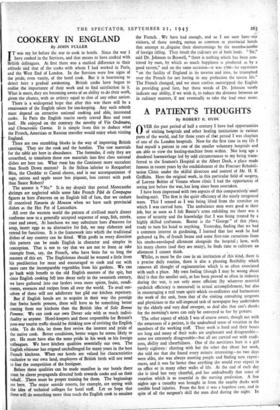COOKERY IN ENGLAND
By JOHN FULLER
TT was my lot before the war to cook in hotels. Since the war I I have cooked in the Services, and that means to have cooked with British colleagues. At first there was a marked difference in their attitude and that of the cooks with whom I had worked in Paris, and the West End of London. In the Services were few signs of the pride, even vanity, of the hotel cook. But it is heartening to detect here a gradual awakening. British cooks have begun to realise the importance of their work and to find satisfaction in it. What is more, they are becoming aware of an ability to do their work, given the chance, with an artistry equal to that of any other nation.
There is a widespread hope that after this war there will be a renaissance of the English talent for inn-keeping. Any such rebirth must depend on attractive national cooking and able, interested cooks. In Paris the English tourist rarely craved Bass and roast beef. He enjoyed on the contrary the novelty of Vin Ordinaire, and Choucrotlie Garnie. It is simple from this to deduce what the French, American or Russian traveller would enjoy when visiting England.
There are two stumbling blocks in the way of improving British catering. They are the cook and the hotelier. The raw materials for the table are here in abundance. The formulas, if only they are unearthed, to transform those raw materials into first class national dishes are here too. What meat has the Continent more succulent than South Down mutton? Is the Stilton inferior to Rocquefort Bleu, the Cheddar to Cantal cheese, and is our accompaniment sage, onions and apple sauce less piquant, less correct with pork than Sauce Robert?
The answer is "No." It is my despair that potted Morecambe shrimps are neglected while some fake French Pâté de Compagne figures as hors d'oeuvres on an English bill of fare, that we endure ill conceived Navarin de Mouton when we have such provincial dishes as the Hot PQt of Lancashire.
All over the western world the pattern of civilised man's dinner conforms now to a generally accepted sequence of soup, fish, entrée, roast and sweet, At luncheon we may substitute hors d'oeuvres for soup, insert eggs as an alternative for fish, we may elaborate and extend for functions. It is the framework into which the traditional dishes of any country can be fitted. With profit in every direction this pattern can be made English in character and simpler in conception. That is not to say that we are not to learn or take example from, say, the French, who have been• for so long the masters of this art. The Englishman should be weaned a little from his predilection for meat and encouraged to cook and eat with more care the incomparable vegetables from his gardens. We can go back with benefit to the old English masters of the spit, but since English cooking fell into decay early in the twentieth century, we have gathered into our larders even more spices, fruits, condi- ments, essences and recipes from all over the world. To avail our- selves of these will not adulterate but gild our kitchen repertory.
But if English hotels are to acquire in their way the prestige that Swiss hotels possess, there will have to be something better coming from our kitchens than the British idea of Sole Bonne Femme. We can cook our own Dover sole with as much indivi- duality as anyone. Hotel-keepers and those responsible for Britain's post-war tourist traffic should be thinking now of reviving the English table. To do this, let them first revive the interest and pride of the native cook. Better conditions, better wages he seems likely to get. He must have also the same pride in his work as his foreign colleagues. We have kitchen qualities essentially our own. The English rotisseur has reigned unchallenged for many years in the best French kitchens. When our hotels are valued for characteristics exclusive to our own land, employees of British birth will not need to fear the competition of the foreigner.
Before these qualities can be made manifest in our hotels there must be clever propaganda directed both towards cooks and on their behalf. There must be proper training for them. The beginnings are here. The major seaside resorts, for example, are toying with the idea of technical colleges for hotel staff. Let us hope that these will do something more than teach the English cook to emulate the French. • We have had enough, and so I am sure have •our visitors, of those tawdr)/, menus so common in provincial hotels that attempt to .disguise their shortcomings by the mumbo-jumbo of foreign titling. They insult the culilary art of both lands. " Sir," said Dr. Johnson to. Boswell, " there is nothing which has been con- trived by man, by which so much happiness is produced as by a good tavern," and on the same occasion—it was 1766—he expatiates " on the facility of England in its taverns and inns, he triumphed over the French for not having in any perfection the tavern life." The French changed, and we must confess outstripped the English in providing good fare, but these words of Dr. Johnson surely indicate our ability, if we wish it, to reduce the distance between us in culinary matters, if not eventually to take the lead once more.






















 Previous page
Previous page